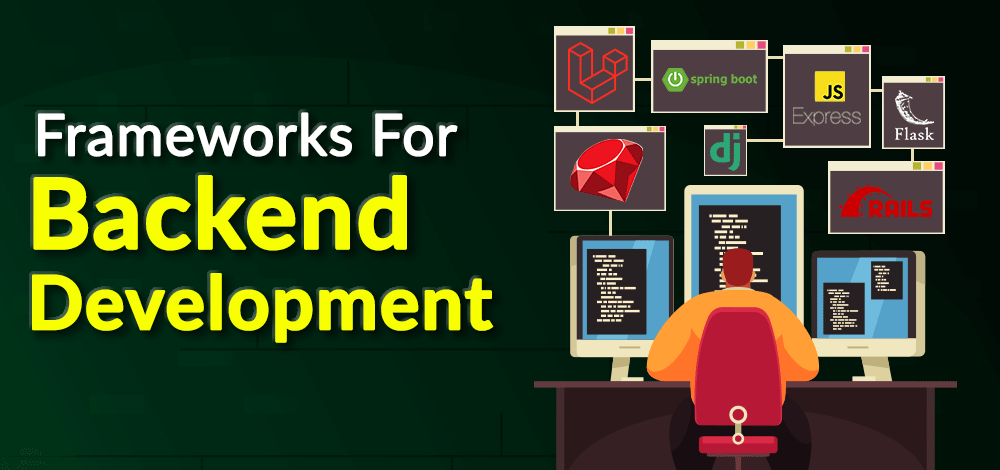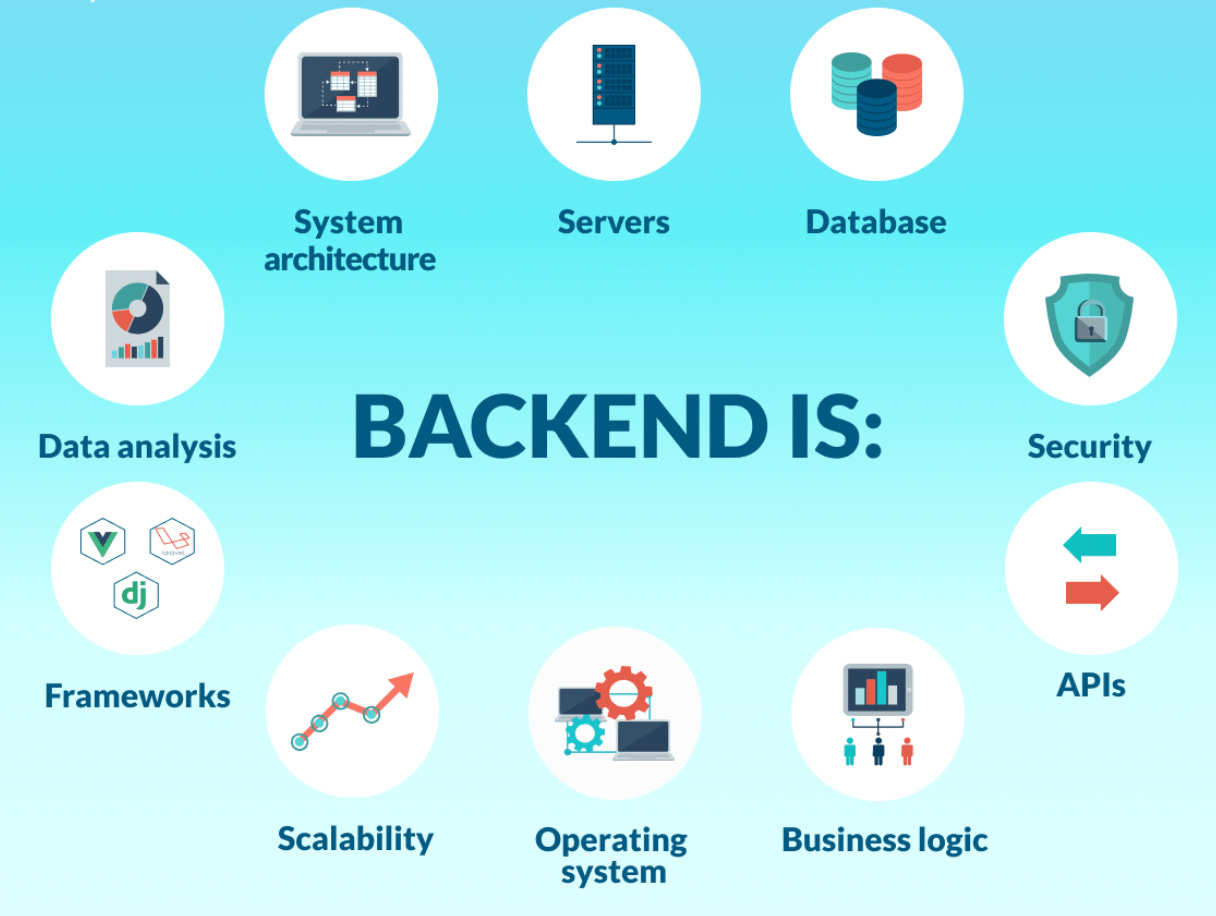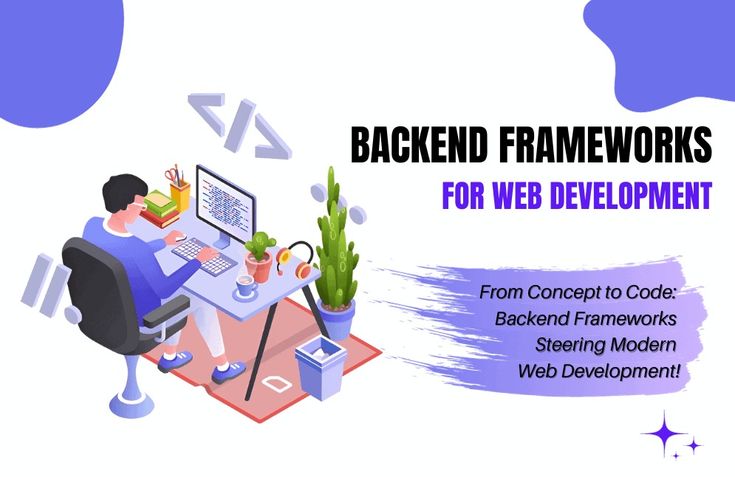Selecting the best Backend frameworks for your project in 2024 is an essential choice as it will determine all the main features of your app, such as performance, scalability, and maintainability. Knowing the best Backend framework, their advantages and particular uses, can help a developer to cater to the different needs of different projects.
By choosing the right framework, one can simplify the application development process, increase security, and provide a robust structure. In this blog, we will discuss what a Backend framework is, its benefits, and what are the top backend frameworks of 2024.
What are Backend Frameworks?

Backend frameworks are connected systems of software that are basically designed simplify the process of Application Development. They provide the users with a structured way to build and maintain high-scale servers. Also, they facilitate the smooth functioning of database management systems, routing, application, and API integration.
These frameworks simplify the complexities involved in setting up a software infrastructure and allow the developer to focus on the software development in a better way.
Some popular Backend frameworks include Django, ASP.NET, Laravel, Express.js, and Ruby on Rails. Each tool has its own unique features and offers different benefits to the users. The benefits and features of these frameworks are also explained in the blog below.
The Advantages of Using Backend Frameworks

Backend Framework offers several benefits other than simplifying the software development process. Some of them are as follows:
1. Security
Backend Frameworks offer a high level of security to the developers. It allows developers to construct of strong and integrated codes for protecting users’ privacy and removing disparities related to site-crash, software problems, lagging, and slowness.
2. Scalability
Backend frameworks are flexible and can handle high demand and increasing loads easily. Also, frameworks like Node.js and Django provide an enhanced structure to facilitate horizontal scaling and resource optimization.
3. Integration
The Backend frameworks provide a simplified and enhanced integration that allows the web applications to interact with external services, tools, and other sources.
4. Time Saving
These frameworks save the time of developers by providing app functionality and pre-written atomic features. Also, the framework supports reducing the bugs and shortening the development cycle, which enhances the overall performance of the application.
Top 5 Backend Frameworks for Your Project in 2024

Here is the list of the top 5 Backend Frameworks that a developer should know about before the end of 2024.
1. ASP.NET Core
ASP.NET is an open-source, multifunctional, and cross-platform framework. Mostly used to create applications using “.NET.” It is a Microsoft sever stack which enables you to create and run applications across various platforms. It also supports various languages, including C#, F#, Visual Basic, and JavaScript.
Features: Dependency Injection, Open-Source, Cross-Platform Framework, Web Application, .NET Core, API Controllers, High Performance, Minimal APIs, Debugging Improvements, and Action Filters.
Benefits:
- Requires minimal coding and support JavaScript language.
- Support enhanced application performance and remove bugs.
- Works smoothly in cross platforms.
2. Django
It is one of the most popular Python-based Backend frameworks that follows modern view-controller architecture. It is most commonly used for building complex and high-performance websites.
Features: Secure, Fully Loaded, Versatile, Active Community, SEO, Admin interface, Rapid Development, Python, OpenSourcs, Documentation, Scalable and Portable.
Benefits:
- Easy to use and learn
- It provides protection against SQL injections, cross-scripting, forgery, and other threats.
- It is a no-code framework.
- Suitable and favorable to create dynamic and highly scalable applications.
3. Laravel
Laravel is a PHP Backend Framework and is most commonly known for designing symphony based web applications.
Features: Template Engine, Routing, Security, Testing, Database Migration, Event Handling, Unit Testing and Maintenance.
Benefits:
- It offers high security and uses a combination of letters, symbols, and characters to make a strong password to protect the privacy of users.
- Simplifies the creation of complex projects.
- Supports multiple log handlers.
4. Ruby on Rails
Ruby on Rails is a very famous Backend framework that is famous for its full-stack capabilities that simplify the app development process. It focuses on creating an infrastructure that builds strong codes, eases the programming process, and automates testing.
Features: Software Testing, Programming Languages, Action Testing, Libraries, MVC Architecture, Scalability, Development, Encryption, Multiple Database, Productivity and Large Community.
Benefits:
- It is adaptable and easily scalable.
- Provides a variety of built-in plugins and modules that make it easy to create apps.
- It is completely free to use.
5. Express.js
Most commonly used Backend Framework that is commonly preferred by the developers to create APIs and web applications. It consists of AngualrJS frontend and NoSQL database. It is usually considered among the best frameworks to create online applications.
Features: Middleware, Templating, Asynchronous, Routing, Community Support, Error Handling, Debugging, and Quick Development.
Benefits:
- It is one of the most accessible programming frameworks.
- It enhances the graphic user interface and overall performance of the application with the help of full-stack JS features.
- It provides high-performance and secure applications.
Create a User-Friendly Web Application with the Best Backend Frameworks Services
Choosing the optimum backend framework for your venture in 2024 is one of the most crucial aspects that determine the success of your application. The right framework provides a well-developed and user-friendly application, scalability, security, and speedy response for the demanded task.
Before choosing any framework, you should analyse the feature it has and the benefit it offers. Also, you can take the help of an Application Development company like Foreignerds to outsource the service or choose the right framework for your application.
Frequently Asked Questions
1. Why is it important to choose the right Backend Framework?
It is important to choose the right Backend Framework because it ensures your application is scalable, maintained, secure, and provides enhanced performance.
2. What factors should you consider before choosing a Backend Framework?
The factors you should consider before choosing a Backend Framework include scalability, performance, ease of use, security, community support, and integration.
3. What is the importance of community support in Backend Frameworks?
Community support is important in the Backend Framework because it ensures access to tutorials, plugins, and helps in solving problems to enhance the working of an application.
4. Can you switch from one Backend framework to another in between the software development process?
Yes, you can switch from one Backend framework to another in between the software development process but it can be a complex as well as challenging task.
5. Does the Backend framework provide tools for testing?
Yes, Backend frameworks provide tools for testing